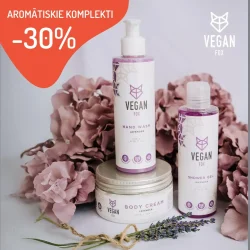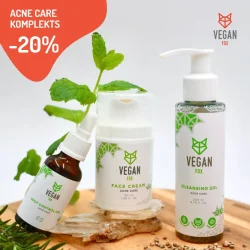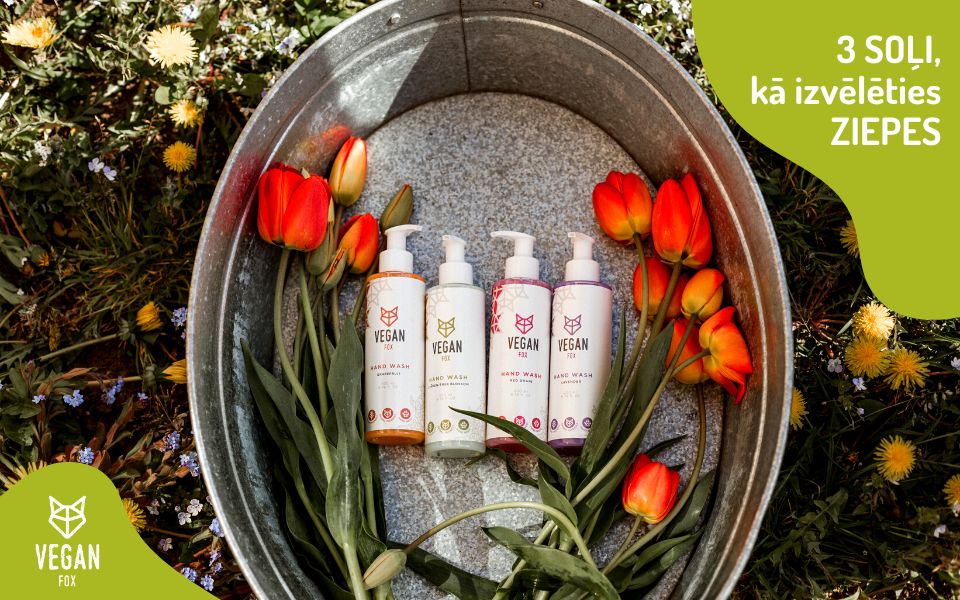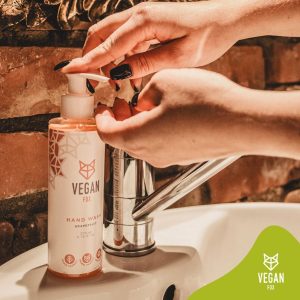Kādēļ izvēlēties īpaši roku ādai paredzētas ziepes?
Lai arī pavasaris iezīmē siltās sezonas sākumu, tomēr – vidē joprojām maldās ne viens vien negants vīruss. Kā sevi pasargāt? Īpaši pavasarī, kad organisma vitamīnu rezerves ir krietni patukšotas, piedomā par sabalansētu uzturu, papildus vitamīnu devu un, kas svarīgi – roku higiēnu.
Pētījumi liecina, ka cilvēks savai sejai vidēji pieskaras 23 reizes stundā, turklāt 44% gadījumu rokas nonāk saskarsmē ar gļotādu, kas vairo iespējas saslimt ar dažādām vīrusu un baktēriju slimībām. Tādēļ – neatkarīgi no tā, vai dodies uz darbu, veikalu vai, iespējams, tikai izej ārā cauri savai kāpņutelpai, paturi prātā, lai netīras rokas nenokļūst saskarsmē ar Tavu seju, tostarp degunu, acīm, muti.
Pavasarī vairums dabas mīļu atklāj arī piknika sezonu – baudot našķus pie dabas, roku mazgāšanu īslaicīgi var aizstāt arī roku dezinfekcija. Un tomēr – kad vien iespējams, izvēlies rokas nomazgāt ar ziepēm, zem tekošas ūdens strūklakas. Turklāt – vēlams dot priekšroku tieši rokām paredzētajām ziepēm, nevis dušas želejai vai citiem higiēnas produktiem. Kādēļ? Roku ziepes visbiežāk ir bagātinātas ar spēcīgākām sastāvdaļām, lai neitralizētu baktērijas, taukus vai jebkādus netīrumus. Savukārt, ķermeņa ziepes jeb dušas želejas parasti ir ar maigāku sastāvu, nekā roku ziepes, tādēļ ne vienmēr pilnvērtīgi tiks galā ar šiem uzdevumiem.
3 argumenti par labu šķidrajām roku ziepēm
Nav noslēpums, ka roku ziepes atšķiras gan ar to sastāvu, gan arī ar formātu. Tā, piemēram, ja skatāmies uz piedāvājumu veikalu plauktos, varam izvēlēties gan šķidrās ziepes, gan arī tradicionālās cietās ziepes (gabaliņos). Mēs savās mājās vairāku iemeslu dēļ dodam priekšroku šķidrajām ziepēm. Tā, piemēram:
- Tās ir ērti lietot, ja mājās ir daudz ziepju lietotāji un arī bērni, turklāt – tas ir daudz higiēniskāk.
Izmantojot šķidrās ziepes, mazinās iespēja “apmainīties” baktērijām ar citiem ziepju lietotājiem; - Izmantojot dozatoru, šķidrās roku ziepes ir vienkārši uzpildīt atkārtoti, turklāt – atšķirībā no ziepēm gabalos, tās ir ērtas lietošanai arī tad, ja tās tuvojas beigām;
- Šķidrajām ziepēm ierasti ir zemāks pH līmenis, tādēļ tās ir saudzīgākas pret ādu.
Taču ņem vērā – ziepes, kuru sastāvā ir ķīmiskas vielas, nodarīs vairāk ļauna, kā laba, tādēļ papildus ir vērts pievērst uzmanību arī šķidro ziepju sastāvam.
3 soļi, kā izvēlēties roku ziepes
Izvēloties roku ziepes, iesaku pievērst uzmanību 3 faktoriem:
1. Izvairies no sastāvā esošiem parabēniem jeb pārmērīgi sintētiskiem konservantiem.
Tos plaši izmanto, lai novērstu baktēriju un pelējuma rašanos higiēnas līdzekļos, vienlaikus tie arī pagarina produkta lietošanas laiku. Taču, lietojot vairākus higiēnas produktus vienlaikus ar salīdzinoši nelielu parabēnu daudzumu sastāvā, tie uzsūcas ādā un, pat “drošs” parabēnu apjoms katrā produktā, kopumā var radīt negatīvas sekas. Tā, piemēram, ziepēs no parabēniem nereti iekļauj metilparabēnu, propilparabēnu, butilparabēnu un etilparabēnu.
2. Izvēlies šķidrās ziepes ar mitrinošu sastāvu.
Īpaši vīrusu sezonā, kad rokas mazgājam biežāk, ir svarīgi izvēlēties mitrinošu sastāvu. Kā iepriekš minēju, veiksmīgāka izvēle būs par labu šķidrajām ziepēm – tās mazāk bojās ādas ārējo virsslāni. Taču arī mitrinošās sastāvdaļas ziepēs var būt dažādas. Minerāleļļu vietā centies izvēlēties dabisku mitrinošu sastāvu – tas ne vien pildīs funkciju, bet arī neradīs ilūziju par mīkstu ādu. Dabīgs mitrinātājs būs, piemēram, alvejas ekstrakts – tā mīkstinošās īpašības novērš ādas kairinājumus, kā arī veicina brūču dzīšanu. Sastāvu var papildināt arī citi mitrinošie elementi – tā, piemēram, betaīns. Šis dabīgais mitrinātājs no cukurbietēm, ar ko bagātinātas arī mūsu šķidrās ziepes, padarīs ādu zīdainu un gludu.
3. Izvēlies sev tīkamu aromātu.
Nav šaubu – šo higiēnas produktu Tu ikdienā noteikti izmanto visbiežāk. Tādēļ izvēlies šķidrās ziepes, kuru aromāts Tev ir tīkams un tik ātri vien neapniks. Vai vēl labāk – radi daudzveidību savā ikdienā, ik pa laikam pamainot šķidro ziepju aromātu. Tā, piemēram, mūsu ziepes vari izvēlēties gan ar atspirdzinošo greipfrūtu smaržu, izsmalcināto lavandas aromātu, saldo vīnogu notīm, gan arī ar vasarīgo liepziedu smaržu. Ja Tu esi jutīga uz aromātiem, iesaku iepriekš notestēt ziepes, lai pārliecinātos, ka tas Tev nešķiet pārāk intensīvs. Kā arī, ja Tava āda ir īpaši jutīga, tad ziepes tāpat kā jebkurš cits ādas kopšanas produkts ir jānotestē mazā daudzumā vislabāk uz apakšdelma vai uz ādas pie elkoņa.
Parūpējies par sevi pavasarī – stiprini savu imunitāti un ļaujies priekam par plaukstošiem pumpuriem!
Mīlestībā,
Maija Rieksta-Riekstiņa
Vegan Fox radītāja un vadītāja



